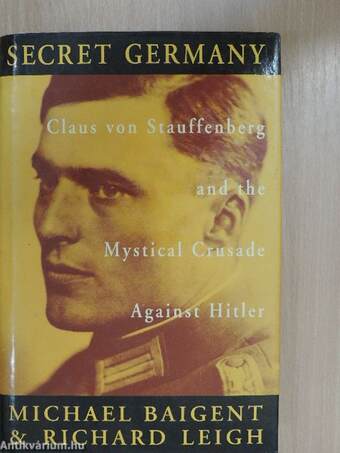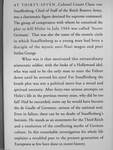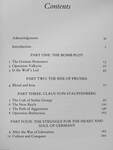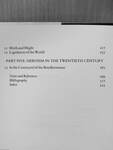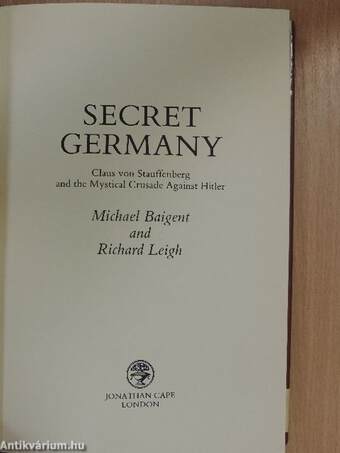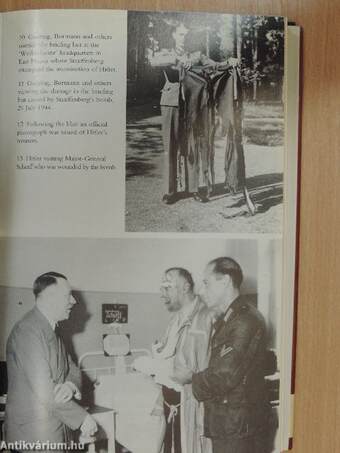1.067.073
kiadvánnyal nyújtjuk Magyarország legnagyobb antikvár könyv-kínálatát

VISSZA
A TETEJÉRE
JAVASLATOKÉszre-
vételek
Secret Germany
Claus von Stauffenberg and the Mystical Crusade Against Hitler
| Kiadó: | Jonathan Cape |
|---|---|
| Kiadás helye: | London |
| Kiadás éve: | |
| Kötés típusa: | Ragasztott kemény papírkötés |
| Oldalszám: | 337 oldal |
| Sorozatcím: | |
| Kötetszám: | |
| Nyelv: | Angol |
| Méret: | 24 cm x 16 cm |
| ISBN: | 0-224-03525-8 |
| Megjegyzés: | Fekete-fehér fotókkal. |
naponta értesítjük a beérkező friss
kiadványokról
naponta értesítjük a beérkező friss
kiadványokról
Fülszöveg
AT THIRTY-SEVEN, Colonel Count Claus von
Stauffenberg, Chief of Staff of the Reich Reserve Army,
was a charismatic figure destined for supreme command.
The group of conspirators with whom he conceived the
plot to kill Hitler in July 1944 was called 'Secret
Germany'. That was also the name of the esoteric circle
in which Stauffenberg as a young man had been a
disciple of the mystic anti-Nazi magus and poet
Stefan George.
What was it that motivated this extraordinary
aristocratic soldier, with the looks of a Hollywood idol,
who was said to be the only man to stare the Fiihrer
down until he averted his eyes? For Stauffenberg the
bomb plot was not a political move but a moral and
spiritual necessity. After forty-two serious attempts on
Hitler's life in the previous twenty years, why did he too
fail? Had he succeeded, some say he would have become
the de Gaulle of Germany, saviour of the national soul.
Even in failure, there can be no doubt of Stauffenberg's
heroism.... Tovább
Fülszöveg
AT THIRTY-SEVEN, Colonel Count Claus von
Stauffenberg, Chief of Staff of the Reich Reserve Army,
was a charismatic figure destined for supreme command.
The group of conspirators with whom he conceived the
plot to kill Hitler in July 1944 was called 'Secret
Germany'. That was also the name of the esoteric circle
in which Stauffenberg as a young man had been a
disciple of the mystic anti-Nazi magus and poet
Stefan George.
What was it that motivated this extraordinary
aristocratic soldier, with the looks of a Hollywood idol,
who was said to be the only man to stare the Fiihrer
down until he averted his eyes? For Stauffenberg the
bomb plot was not a political move but a moral and
spiritual necessity. After forty-two serious attempts on
Hitler's life in the previous twenty years, why did he too
fail? Had he succeeded, some say he would have become
the de Gaulle of Germany, saviour of the national soul.
Even in failure, there can be no doubt of Stauffenberg's
heroism. He stands as an atonement for the Third Reich
and a resolution of the conflicting myths of German
culture. In this remarkable investigation his whole life
explains a troubled past to the present generation of
Europeans as few have done in recent history. Vissza
Témakörök
- Idegennyelv > Idegennyelvű könyvek > Angol > Történelem > Európa története > Egyéb
- Történelem > Életrajz > Politikusok, történelmi személyiségek > Külföldi
- Történelem > Idegennyelvű > Angol
- Történelem > Kontinensek szerint > Európa, európai országok története > Nyugat-Európa > Németország
- Történelem > Legújabb kor > II. világháború > Egyéb
Megvásárolható példányok
Nincs megvásárolható példány
A könyv összes megrendelhető példánya elfogyott. Ha kívánja, előjegyezheti a könyvet, és amint a könyv egy újabb példánya elérhető lesz, értesítjük.



